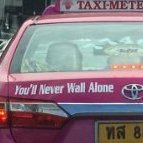Using foreign visa card. What currency to pay with?
-
Recently Browsing 0 members
- No registered users viewing this page.
-
Topics
-
-
Popular Contributors
-
-
Latest posts...
-
136
Advise on buying a BYD car.
I think the Atto claims 20-80% in something like 30 minutes. That's probably not far off real life. The max rate the Atto will charge at is just under 90 kW/h. I don't know about Sealion. But thing to bear in mind is that it doesn't really matter at the moment, in Thailand, what your max charge rate is because at a typical PTT station the chargers run I think at 150 kW max output. They can charge two cars at the same time ... but the total capacity is 150 so you often end up with much less as it's split between the two cars. DC fast charging is also not supposed to be great for battery longevity if it's the way you intend to charge on a regular basis (as opposed to home AC). Range is very variable: basically the faster you go, the quicker the battery drains. If I go to Jomtien at 100 kmh it's much better for range than going at 120 kmh. Atto is supposed to be 480 km and I think that's quite possible with car in Eco mode and driving at 80-90 kmh and avoiding any heavy acceleration. But that's really tedious and one of the pleasures of EVs is instant torque. The Atto is supposed to do 0-100 kmh in about 7 seconds; it will do it in nearer 6.5. In the 1980s that was hot hatch performance. Of course it's a lardy SUV so its general handling can politely be described as cumbersome. But for overtaking that torque is very handy. Tyre inflator - I have a heavy duty Makita one, but in part because the battery can be used with other Makita power tools. Wasn't very expensive - i think 1500 baht or something like that. -
61
Why Are You Really Here? Downtime Hobby or Desperate Obsession?
2 hours... what took you so long? -
30
SPOILER - JD Vance will win in 2028 and 2032
June 2024 Jingthing - Vance is the worst VP pick ever -
286
My view today.
Which it never took in the first place! It's nanny must have downloaded them for it! -
305
Trump "Winning" thread
Next TACO on the way in 26 days https://finance.yahoo.com/news/live/trump-tariffs-live-updates-trump-set-to-impose-tariffs-of-up-to-70-in-letter-push-as-july-9-deadline-looms-200619585.html Trump says trading partners will receive tariff letters 'over the next few days' President Trump said his administration would begin sending letters to trading partners, laying out what tariff rates they will face on imports to the US. Countries will have to start paying the duties from Aug. 1, Trump told reporters on Thursday. The move marks a shift from earlier US optimism that talks would deliver scores of deals with its more than 170 trading partners, under pressure to beat a July 9 tariff deadline. -
30
-
-
Popular in The Pub







.thumb.jpeg.d2d19a66404642fd9ff62d6262fd153e.jpeg)


.thumb.jpg.4fd22303fa94eb0a6ebf5a9cf7194eb4.jpg)


Recommended Posts
Create an account or sign in to comment
You need to be a member in order to leave a comment
Create an account
Sign up for a new account in our community. It's easy!
Register a new accountSign in
Already have an account? Sign in here.
Sign In Now